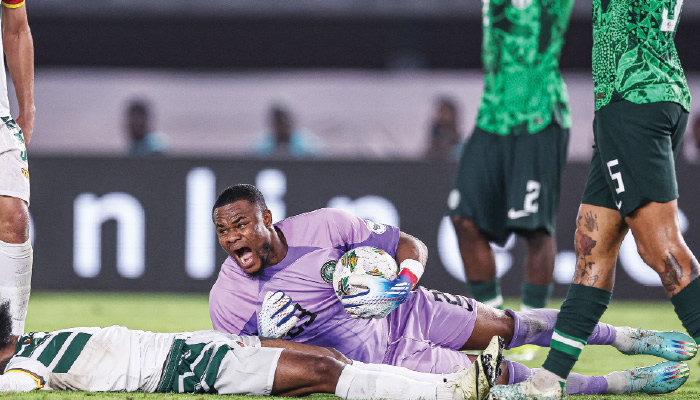The Super Eagles, Nigeria’s national football team, face a looming concern in their goalkeeping department. While Stanley Nwabali has firmly established himself as the first-choice goalkeeper, the lack of substantial competition for his position poses a potential threat to the team’s long-term success. This contrasts sharply with the team’s abundance of attacking talent, where several players readily vie for starting roles. Nwabali’s consistency and resilience, particularly amidst personal tragedy, have been commendable. His performances, including a standout showing at the 2023 AFCON where he helped Nigeria secure a silver medal, have earned him praise and attracted interest from European and Middle Eastern clubs. However, the absence of a strong challenger pushing Nwabali to constantly improve raises concerns about complacency and potential stagnation.
The current pool of backup goalkeepers presents a mixed bag of challenges and uncertainties. Francis Uzoho, once considered a strong contender, has struggled with limited playing time and injury setbacks at his club, Omonia Nicosia. Maduka Okoye, another potential rival, faces an uncertain future due to his involvement in a betting scandal. Ojo Olorunleke, previously seen as a promising option, is currently without a club after his contract was terminated. While Adebayo Adeleye has displayed consistent form in the Cypriot league, his limited international experience and the comparatively lower level of competition raise questions about his readiness for the demands of top-tier international football. This scarcity of established and in-form alternatives underscores the urgency of addressing the depth issue within the Super Eagles’ goalkeeping ranks.
The lack of immediate and readily available replacements has prompted the Nigerian Football Federation (NFF) to explore emerging talents and potential future prospects. Arthur Okonkwo, an Arsenal academy graduate currently on loan at Wrexham, has impressed with his commanding presence and ball-playing abilities. Owen Goodman, a Crystal Palace academy product, has also shown interest in representing Nigeria, signaling a potential addition to the pool of goalkeeping options. These young players represent a longer-term investment in the future of the Super Eagles’ goalkeeping department, but their relative inexperience at the highest levels of competition necessitates careful evaluation and development.
Beyond the domestic and English leagues, the NFF is also considering players with Nigerian heritage playing abroad. Noah Atubolu, a highly-rated goalkeeper in the Bundesliga, presents an intriguing possibility, although he remains uncapped by Germany at the senior level. Tobias Lawal, another potential option playing in Austria, previously trained with the Eagles but faced citizenship-related obstacles. Amas Obasogie, currently playing in Tanzania, has a history of call-ups to the national team, but his current lack of top-flight experience raises questions about his immediate readiness for international competition. These diverse options highlight the NFF’s proactive approach to identifying and nurturing potential goalkeeping talent.
The current situation mirrors a broader challenge facing Nigerian football: maintaining depth and quality across all positions. While Nwabali’s emergence has temporarily addressed the goalkeeping void left by Vincent Enyeama’s retirement, the lack of competition risks hindering both his individual development and the overall progress of the team. The historical legacy of Nigerian goalkeeping, with iconic figures like Emmanuel Okala, Peter Rufai, and Vincent Enyeama, underscores the importance of nurturing a robust and competitive goalkeeping pool. These legendary keepers often benefited from fierce competition for their positions, which drove them to consistently perform at their best.
Looking ahead, addressing this goalkeeping depth crisis is crucial for the Super Eagles’ success in upcoming competitions, particularly the 2026 World Cup qualifiers. While Nwabali’s position as the current number one remains secure, the long-term health of the team requires the emergence of credible challengers. The coming months will be pivotal in determining whether any of the identified prospects can rise to the occasion and provide the necessary competition to ensure the Super Eagles maintain a high standard in their last line of defense. This requires strategic planning, careful player development, and a proactive approach to scouting and recruitment. The future of Nigerian goalkeeping relies on fostering a competitive environment that pushes individuals to excel and ensures the national team has a reliable and capable custodian between the posts.


